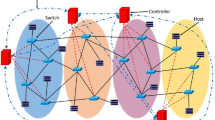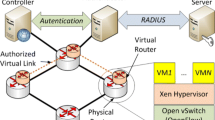Abstract
Many interactive applications require continuous user interaction, for example ssh and many web applications like online games. The TCP connections created by these applications are in a class called interactive. When interactive applications suffer from packet loss, packet retransmission time severely increases the user perceived delay. This work introduces a Dynamic Priority RED Queue (DPRQ) algorithm that dynamically changes the priority of queues instead of dropping packets when the interactive queue is overloaded. The algorithm reduces the user perceived delay by reducing packet loss in interactive TCP connections. The DPRQ is compared to an existing Class-Based Queue which incorporates RED (RCBQ) as would typically be used for Assured Forwarding. An analytical model of the DPRQ and RCBQ is presented with both experimental and analytical results. The DPRQ is found to decrease packet loss by up to eight times and therefore provide a lower user perceived delay even though queuing delay is increased by up to five times.
Similar content being viewed by others
References
U. Bodin, O. Schelen and S. Pink, Load-tolerant differentiation with active queue management, SIGCOMM Computer Communication Review 30(3) (2000) 4–16.
D. Clark and W. Fang, Explicit allocation of best-effort packet delivery service, IEEE/ACM Transactions on Networking 6(4) (1998) 362–373.
P. Dimopoulos, P. Zeephongsekul and Z. Tari, Modelling the burstiness of the TCP protocol, in: Proceedings of the IEEE International Symposium in Modeling, Analysis, and Simulation of Computer and Telecommunication Systems (MASCOTS) (IEEE 2004), pp. 175–183.
P. Dimopoulos, P. Zeephongsekul and Z. Tari, Reducing the user perceived delay of interactive TCP connections using a dynamic priority approach, Technical Report TR-05-2, RMIT (2004).
S. Floyd and V. Jacobson, Random early detection gateways for congestion avoidance, IEEE/ACM Transactions on Networking 1(4) (1993) 397–413.
S. Floyd and V. Jacobson, Link-sharing and resource management models for packet networks, IEEE/ACM Transactions on Networking 3(4) (1995) 365–386.
J. Heinanen, F. Baker, W. Weiss and J. Wroclawski, Assured forwarding PHB group request for comments 2579, Technical report, IETF (1999).
P. Hurley, J.-Y. Le Boudec, P. Thiran and M. Kara, Abe: providing a low-delay service within best effort, IEEE Network 15(3) (2001) 60–69.
C. Knessl, D. Choi and C. Tier, A dynamic priority queue model for simultaneous service of two traffic types, SIAM Journal on Applied Mathematics 63(2) (2002) 398–422.
G. Liang, and I. Matta, The war between mice and elephants, in: Ninth International Conference on Network Protocols (ICNP), (2001), pp. 180–188.
W. Noureddine and F. Tobagi, Improving the performance of interactive TCP applications using service differentiation, in: Proceedings of the Twenty-First Annual Joint Conference of the IEEE Computer and Communications Societies. INFOCOM (2002), Vol. 1, pp. 31–40.
V. Paxson and M. Allman, Computing TCP’s retransmission timer. request for comments (standards track) rfc 2988, Technical report, Internet Engineering Task Force (2000).
S. Sahu, D. Towsley and J. Kurose, A quantitative study of differentiated services for the internet, in: Global Telecommunications Conference (GLOBECOM) (1999) Vol. 3, pp. 1808–1817.
Author information
Authors and Affiliations
Corresponding author
Additional information
This project is fully supported by the ARC Discovery Grant no. DP0346545 awarded by the Australian Research Council (ARC) for 2003--2005 and Sun Microsystems.
Peter Dimopoulos graduated with a Ph.D. student at RMIT University (school of Computer Science and Information Technology) in December 2006. His research interests are in queuing, TPC congestion control and performance in general.
Panlop Zeephongsekul received his B.Sc. degree with honours from Melbourne University and a Ph.D. degree from the University of Western Australia. He is currently an Associate Professor in the School of Mathematical and Geospatial Sciences at RMIT University, Melbourne, Australia. His research interests are in stochastic point processes, fuzzy sets, game theory, queueing theory and software reliability analysis, and he has published papers in all these areas. His papers have appeared in Annals of Probability, Journal of Applied Probability, IEEE Transactions on Reliability, Fuzzy Sets and Systems, Journal of Optimization Theory and Applications, Asia Pacific Journal of Operational Research, European Journal of Operational Research and many other international journals. He has also been involved in many consulting projects, especially in applied Statistics and design and analysis of experiments.
Zahir Tari a full professor at RMIT University, School of Computer Science. He is also the director of the DSN (Distributed Systems and Networking) discipline, focusing on specific topic of performance, security, and reliability in middlewares and mobile systems. His specific interests and research are in the area of performance for distributed systems and specifically web servers. Professor Tari has been Program Committee Chair and General Chair of more than 12 international conferences (e.g. ODBASE, DOA, CoopIS, GADA, IFIP DS 11.3 on DBSec, IFIP 2.6 on Data Semantics). He is the co-author of several books. Professor Tari also published in several reputable journals (such as ACM Transactions on Databases and IEEE Transactions on Parallel and Distributed Systems). More details about Professor Tari and his discipline could be found at http://www.cs.rmit.edu.au~zahirt and http://www.cs.rmit.edu.au/eCDS.
Rights and permissions
About this article
Cite this article
Dimopoulos, P., Zeephongsekul, P. & Tari, Z. A dynamic priority approach to reducing delay in interactive TCP connections. Telecommun Syst 34, 59–70 (2007). https://doi.org/10.1007/s11235-006-9022-0
Received:
Revised:
Accepted:
Published:
Issue Date:
DOI: https://doi.org/10.1007/s11235-006-9022-0




